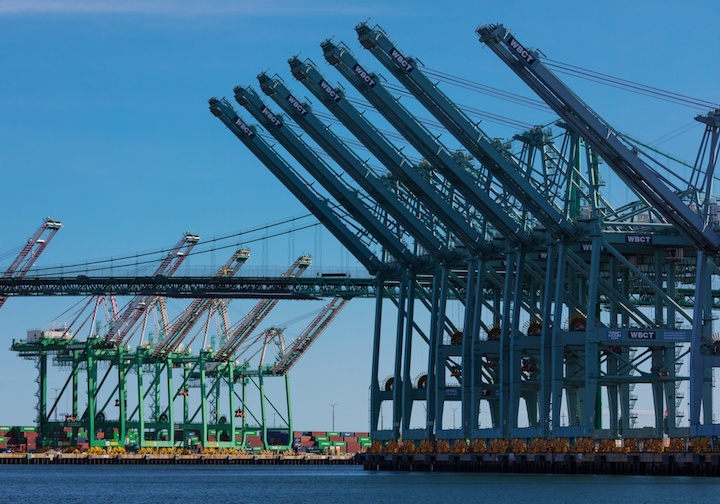Accustomed to running at full speed this time of year, George Powers has watched as a shipping slowdown tied to the coronavirus sidelines more than half his warehouse workers at the usually bustling Port of Savannah on the U.S. East Coast.
“Savannah continues to boom as a port of entry and export, but this situation with China with most factories being shut down has curtailed cargo coming in,” said Powers, chief executive of TradePort Logistics LLC, which operates two warehouses at the Georgia seaport.

While the global economy is reeling from the spreading virus, seaports are a bellwether for trade because they handle a hefty 90% of all world shipping. The squeeze on ports like Los Angeles, the biggest in the U.S. for container traffic, illustrates the vast potential for economic harm from a virus-induced slowdown. Clothing, cars and an array of consumer goods from Asia are offloaded in Los Angeles and nearby Long Beach—a crucial web that stitches together trucks, railroads, distribution centers and showrooms.
It all follows a bumpy couple of years for global commerce, which was dominated by supply-chain disruptions from the U.S-China trade war that eased this year with an initial deal.
“Alarm is the word,” said Jock O’Connell, a foreign trade consultant in California. “The demand for longshore labor has been down, but the real victims are the truck drivers who get paid by the load and the warehouse workers, who process goods.”
Some of the most severe effects can be found at Port of Los Angeles, the U.S.’s busiest by volume.
Farm Goods
Work opportunities for members of the International Longshore and Warehouse Union in Los Angeles were cut by half recently. Meantime, shifts have completely dried up for so-called “casuals,” certain port workers who are not union members, according to ILWU.
All told, cargo vessel operators have canceled 40 sailings into the Port of Los Angeles for the period from mid-February through April 1, executive director Gene Seroka told Los Angeles City Council last week. Cargo volume fell 23% in February because of the coronavirus fallout, as well as the Lunar New Year holiday in China, the port announced Tuesday, while it sees volumes dropping 17% for the first quarter. About 10% fewer containers were handled at Long Beach last month.
“Perishable commodities and agricultural products are stacking up at our ports because of those vessel sailing cancellations,” Seroka said.
Likewise, officials at the Rotterdam port estimate that coronavirus is reducing volume by about 2 million tons a month.
Passing Assumption
“We assume that this is going to pass and when it does we expect that production will kick back in,” said Leon Willems, a spokesman for the Port of Rotterdam. “Whether that neutralizes the decline that we’re seeing now, I’m not sure.”
The Port Authority of New York and New Jersey expects at least 10 cancellations this month out of 180 arrivals scheduled. And, Port Houston, which handles around 70% of the containers moving through the Gulf of Mexico, has seen six vessel sailings canceled this month, spokeswoman Lisa Ashley said.
Elsewhere in Texas, the Port of Corpus Christi recently surpassed Houston to become the country’s largest source of U.S. crude exports, but now expects customers to cut back after a steep drop in global oil prices.
As they deal with cancellations, port and shipping executives are coping with some vexing labor and logistical challenges stemming from the outbreak. The executive director of the Port Authority of New York and New Jersey, Rick Cotton, caught the coronavirus and is on home quarantine.
In Singapore, home to the world’s second-busiest container port after Shanghai, the virus outbreak has added to trade-war constraints from last year. Port workers in the city state, which has more than 160 confirmed virus cases, have their temperature screened and don personal protective equipment. They work in split-team arrangements as part of “stringent precautionary measures,” according to a spokesperson from PSA Singapore, a unit of PSA International Pte, the world’s biggest container port operator.
Los Angeles, especially, is coping with an overload of shipping containers lately and running out of places to store them. The outbreak has disrupted the usual balance of trips between the U.S. and Asia, with too few vessels arriving in L.A. to take the containers back to Asia.
Shipping giant A.P. Moller-Maersk A/S has pledged to help the port move the empty containers later this month, Seroka said.
“It’s a very serious logistical problem, trying to work through that and not winding up with an enormous amount of congestion,” O’Connell, the consultant, said.










